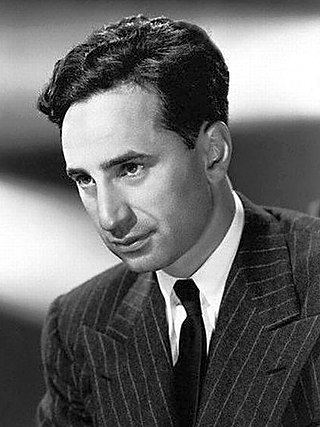
Elias Kazantzoglou, known as Elia Kazan, was an American film and theatre director, producer, screenwriter and actor, described by The New York Times as "one of the most honored and influential directors in Broadway and Hollywood history".
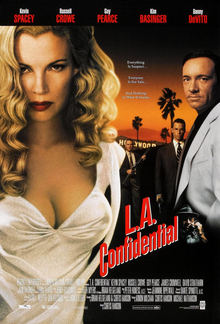
L.A. Confidential is a 1997 American neo-noir crime film directed, produced, and co-written by Curtis Hanson. The screenplay by Hanson and Brian Helgeland is based on James Ellroy's 1990 novel of the same name, the third book in his L.A. Quartet series. The film tells the story of a group of LAPD officers in 1953, and the intersection of police corruption and Hollywood celebrity. The title refers to the 1950s scandal magazine Confidential, portrayed in the film as Hush-Hush.

Pretty Woman is a 1990 American romantic comedy film directed by Garry Marshall, from a screenplay by J. F. Lawton. The film stars Richard Gere and Julia Roberts, and features Héctor Elizondo, Ralph Bellamy, Laura San Giacomo, and Jason Alexander in supporting roles. The film's story centers on Hollywood prostitute Vivian Ward and wealthy businessman Edward Lewis. Vivian is hired to be Edward's escort for several business and social functions, and their relationship develops during her week-long stay with him. The film's title Pretty Woman is based on the 1964 song "Oh, Pretty Woman" by Roy Orbison. The original screenplay was titled “3,000”, and was written by then-struggling screenwriter J. F. Lawton. It is the first film on-screen collaboration between Gere and Roberts; their second film, Runaway Bride (1999), and also the second film on-screen collaboration between Gere and Elizondo, after American Gigolo (1980), with the next one is Runaway Bride (1999).

Klute is a 1971 American neo-noir psychological thriller film directed and produced by Alan J. Pakula, and starring Jane Fonda, Donald Sutherland, Charles Cioffi and Roy Scheider. Its plot follows a high-priced New York City call girl who assists a detective from Pennsylvania in solving the missing person case of a john who may be stalking her. It is the first installment of what has informally come to be known as Pakula's "paranoia trilogy", followed by The Parallax View (1974) and All the President's Men (1976), all films dealing with themes of paranoia, conspiracies and surveillance.
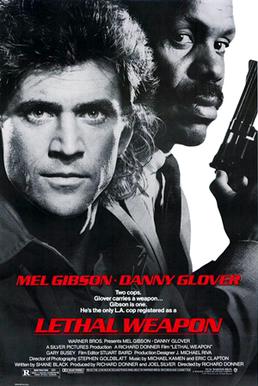
Lethal Weapon is a 1987 American buddy cop action comedy film directed and co-produced by Richard Donner, written by Shane Black, and co-produced by Joel Silver. It stars Mel Gibson and Danny Glover alongside Gary Busey, Tom Atkins, Darlene Love, and Mitchell Ryan.

My Own Private Idaho is a 1991 American independent adventure drama film written and directed by Gus Van Sant, loosely based on Shakespeare's Henry IV, Part 1, Henry IV, Part 2, and Henry V. The story follows two friends, Mike Waters and Scott Favor, played by River Phoenix and Keanu Reeves respectively, as they embark on a journey of personal discovery that takes them from Portland, Oregon, to Mike's hometown in Idaho, and then to Rome in search of Mike's mother.
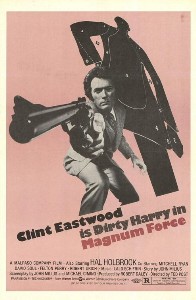
Magnum Force is a 1973 American neo-noir vigilante action thriller film and the second to feature Clint Eastwood as maverick cop Harry Callahan after the 1971 film Dirty Harry. Ted Post, who had previously worked with Eastwood on Rawhide and Hang 'Em High, directed the film. The screenplay was written by John Milius and Michael Cimino. The film score was composed by Lalo Schifrin. This film features early appearances by David Soul, Tim Matheson and Robert Urich. At 124 minutes, it is the longest of the five Dirty Harry films.

Margaret Avery is an American actress and singer. She began her career appearing on stage and later had starring roles in films including Cool Breeze (1972), Which Way Is Up? (1977), Scott Joplin (1977), and The Fish That Saved Pittsburgh (1979).
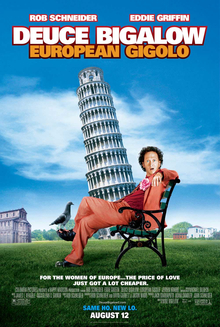
Deuce Bigalow: European Gigolo is a 2005 American sex comedy film directed by Mike Bigelow from a screenplay by Rob Schneider, David Garrett, and Jason Wardand. The film is the sequel to Deuce Bigalow: Male Gigolo (1999). It stars Schneider, Eddie Griffin, Til Schweiger, and Jeroen Krabbé in supporting roles. The plot involves male prostitute Deuce Bigalow visiting his former pimp T.J. in Amsterdam, and looking for a murderer who is killing the greatest "man-whores" of Europe.

Vice Squad is a 1982 American exploitation crime thriller film directed by Gary Sherman and starring Wings Hauser, Season Hubley, and Gary Swanson. Its plot follows a Los Angeles businesswoman-turned-prostitute who is enlisted by the Los Angeles Police Department to help apprehend a homicidal and misogynistic pimp. The original music score was composed by Joe Renzetti and Keith Rubinstein. Wings Hauser sang the vocal track for the film's opening and closing theme song, "Neon Slime".
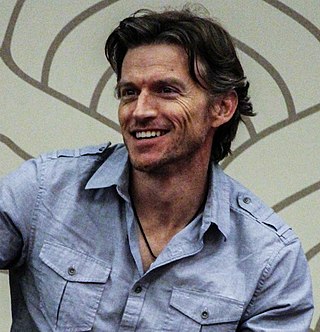
Gideon Emery is an English actor and singer. He is best known for his role as Deucalion in Teen Wolf and for providing voice-over work in video games, television series and films.

Luster is a 2002 American drama film written and directed by Everett Lewis. The film is about a weekend in the lives of a group of friends in the Los Angeles queer punk scene. Lewis sought to "infuse queerness" into the film as much as he could, so he cast a number of non-heterosexual actors and used music by a number of queer punk bands. Critical response to Luster was deeply divided.
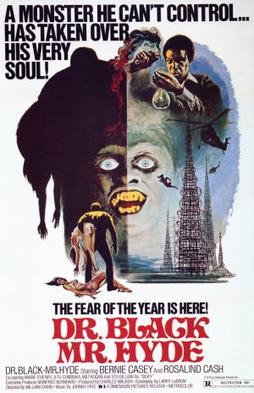
Dr. Black, Mr. Hyde is a 1976 blaxploitation horror film loosely inspired by the 1886 novella Strange Case of Dr. Jekyll and Mr. Hyde by Robert Louis Stevenson. The film stars Bernie Casey and Rosalind Cash, and was directed by William Crain. Along with Crain, and it was written by Larry LeBron and Lawrence Woolner with cinematography by Tak Fujimoto. It was filmed primarily in Los Angeles, at locations such as the Watts Towers.

The Life and Times of Judge Roy Bean is a 1972 American Western comedy film written by John Milius, directed by John Huston, and starring Paul Newman. It was loosely based on the life and times of Judge Roy Bean.
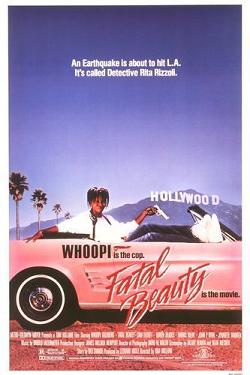
Fatal Beauty is a 1987 American action comedy thriller film directed by Tom Holland, and starring Whoopi Goldberg as Detective Rita Rizzoli, and Sam Elliott as Mike Marshak. The screenplay was written by Hilary Henkin and Dean Riesner. The original music score was composed by Harold Faltermeyer, of Top Gun fame. The film was marketed with the tagline "An earthquake is about to hit L.A. It's called Detective Rita Rizzoli."

Procuring, pimping or pandering is the facilitation or provision of a prostitute or other sex worker in the arrangement of a sex act with a customer. A procurer, colloquially called a pimp or a madam or a brothel keeper, is an agent for prostitutes who collects part of their earnings. The procurer may receive this money in return for advertising services, physical protection, or for providing and possibly monopolizing a location where the prostitute may solicit clients. Like prostitution, the legality of certain actions of a madam or a pimp vary from one region to the next.

Ed Fury was an American bodybuilder, actor, and model. He is best known for starring in a number of "sword-and-sandal" films in the 1950s and 1960s. Fury returned to acting in the early 1970s and appeared mostly in small parts in television series.

Hung is an American comedy-drama television series that ran on HBO from June 28, 2009, to December 4, 2011. It was created by Colette Burson and Dmitry Lipkin, and stars Thomas Jane as Ray Drecker, a struggling suburban Detroit high-school basketball and baseball coach who resorts to prostitution. The second season premiered on June 27, 2010, and concluded its 10-episode run on September 12, 2010. The third season premiered on October 2, 2011, and concluded its 10-episode run on December 4, 2011. The series was cancelled after three seasons.
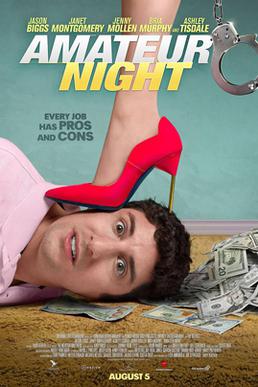
Amateur Night is a 2016 American comedy film written and directed by Lisa Addario and Joe Syracuse. Their early experiences in Hollywood were the basis for the plot of the film. The film stars Jason Biggs, Jenny Mollen, Janet Montgomery, Ashley Tisdale and Bria Murphy.

Hollywood is an American drama streaming television miniseries starring an ensemble cast including David Corenswet, Darren Criss, Laura Harrier, Joe Mantello, Dylan McDermott, Jake Picking, Jeremy Pope, Holland Taylor, Samara Weaving, Jim Parsons, and Patti LuPone. Created by Ryan Murphy and Ian Brennan, it was released on Netflix on May 1, 2020.




















